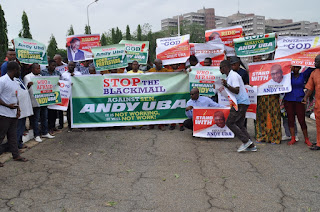Maulag or Unilag?... My Opinion. By Wale Bakare
“After very careful consideration, and in honour of Chief M.K.O. Abiola’s accomplishments and heroism, on this Democracy Day, the University of Lagos, is renamed by the Federal Government of Nigeria, Moshood Abiola University, Lagos,"
This statement dropped like a bombshell during the Presidential National broadcast speech to commemorate the celebration of Democracy day by the grand commander -in-Chief Dr Goodluck Jonathan. The ferocity with which the news spread like wildfire heralded an immediate response by the MAULAG students’ formally UNILAG. The Students poured out on the streets in their numbers to protest what they termed an untimely injustice and thus expressing their grievances over the renaming of their school after Moshood Abiola; the acclaimed winner of the 1993 Presidential general election.
Placards of various sizes were on display with anti-Jonathan slogan and chanting of solidarity songs to press further their message. Now from my own perspective, I do understand the rich cultural heritage and landmark achievements that accords the University of Lagos, but protests from students that barely knows the history of the school and the importance attached to the “Democracy” which they are of major beneficiary calls for a revamp of our societal norms.
At this point in time permit me to say objectively that our students have misplaced their primary priority as future leaders of tomorrow. Was the revolt and demonstration in protest of the changed name? Or, hitherto in protest of the military-like-manner Jonathan enforced the change? While i strongly agree that the name is a long standing identity tag therefore should not be changed arbitrary. I refuse to indulge myself in believing that the change in the name is consequential to denial of access to certain privileges and opportunities.
To provoke your thoughts a bit further, an insight to the daily times media online, where several Maulites were interviewed in the wake of the crisis. The excerpts below to their reaction should interest you.
A student who identifies himself as Tosin wrote.. “It's just so uncool, it doesn't sound right, we don't want to be called MAUNI or MAULAG students, we're from UNILAG"
A 300 level political science student of the school, Aishat Jimoh, said "instead of changing the school's name, they should build a hostel or school and name it after him.
And finally, the last straw that broke the camel’s back confirming a rot in our history department.
Bisola Mohammed, a Sociology student of the institution said...... “We are not pleased with the name change because Abiola is not from Lagos, but from Ogun State."
Upon reading all these, Goodluck Jonathan must be grinning awkwardly, at least he isn’t the only clueless one.
No doubt the decision to rename the institution remains an unpopular decision without due consultation of the FEC, the University senate and the Alumni. Ultimately a protest against the backdrop of the standard in the Education system and the non-autonomy of the University would have been a more reasonable cause to channel rather than engage in frivolous reprehensive protests.
Wale Bakare writes from Lagos. You can follow him on twitter @waleflame




Comments
Post a Comment